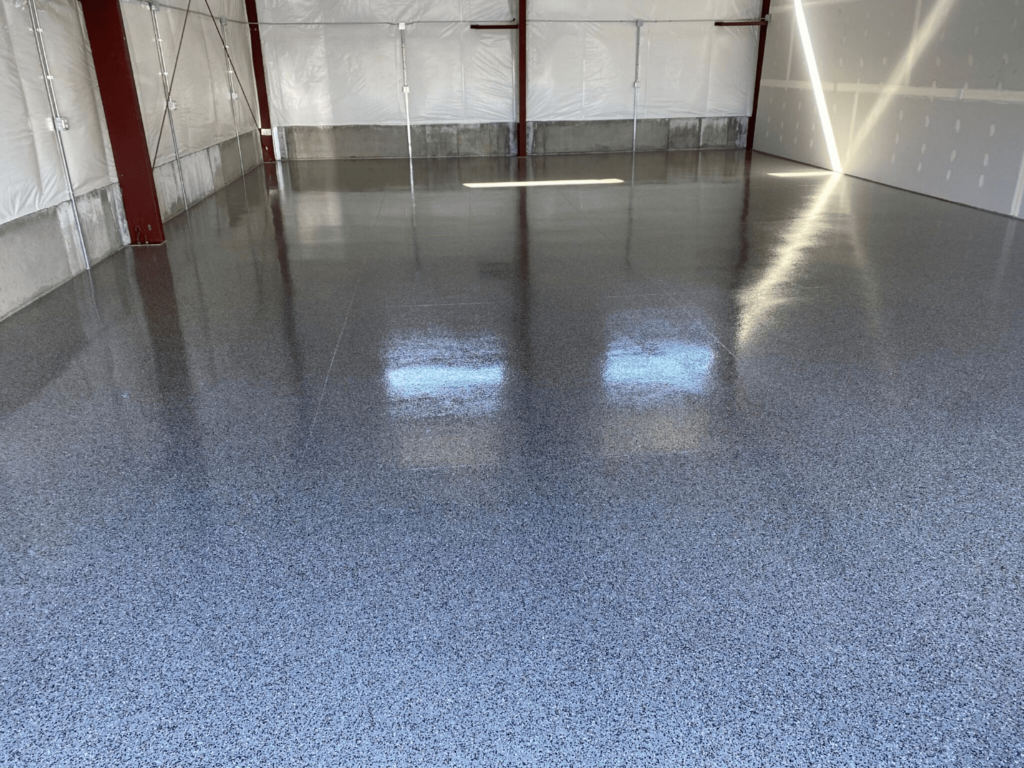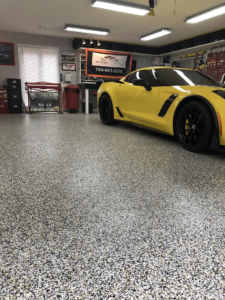Concrete is one of the sturdiest and most stable flooring materials you can find in the market. It’s an ideal choice for heavily abused and high-traffic areas such as your garage flooring. However, concrete flooring isn’t completely impermeable, so it is prone to damage. This guide by our epoxy flooring contractors will discuss the major causes of concrete damage and how to avoid them.
Climatic Conditions
A common cause of concrete damage in your garage flooring is the alternate freeze-thaw cycle which typically affects the exterior concrete slabs as well as garage and basement floors. The impact winter has on your garage concrete flooring can result in serious damage in the long run. That’s because concrete is vulnerable to sudden temperature changes.
Concrete expands with an increase in temperature and contracts as it cools. These constant changes occurring lead to developing cracks in the garage floor. Even if these cracks are minor, we recommend you hire an expert to inspect the flooring and have it repaired.
Pitting or Spalling
Flakes and pits often peel off around the joints and surfaces of concrete flooring because of freeze-thaw cycles and inappropriate pouring at the outset. When mixing concrete, flooring contractors must consider the climate, whether it’s dry, wet, hot, or cold. Pay close attention to the edges and joints of the flooring and ensure that they’re adequately covered.
Other causes of pitting include not allowing the product to cure completely for the recommended duration. Moreover, heavy usage over time also leads to spalls and pits in the concrete flooring.
Lack of Reinforcement
Concrete flooring is reinforced with rebar or steel, which makes it more robust and less vulnerable to cracking. It also allows the flooring to hold more weight. Using the wrong type of reinforcement or too little of it leads to crumbling, cracking, and sacking in your garage flooring.
As a result, you may end up dealing with dangerous and unsightly metal. This issue can be avoided by hiring a professional floor contractor to properly pour concrete because the older concrete layer can’t be repaired.
Increased Humidity
Moisture in flooring is another major cause of concrete damage, so it must be water-proofed. For instance, water infiltration in your garage basement can affect your concrete floor’s durability, especially if the matter is left unaddressed for too long.
Garage floors that have frequent contact with snow or water are also prone to developing long-term problems. You have the option to install joints in your concrete garage flooring to prevent the slabs from cracking.
Abrasive Products and Poor Maintenance
Concrete flooring requires proper maintenance using adequate equipment and cleaning products. Bleach and ammonia are two agents that must be avoided when cleaning these floors. That’s because they end up damaging your floor in the long run. You can rather use a mixture of baking soda and water as it’s a safer option for concrete and works wonders.
Sodium chloride used to melt ice in snowy regions can also damage concrete flooring if it has no coating. The abrasive salt can chip your garage floor if it’s not properly cleaned.
Settling Concrete
Pouring concrete mix over soil causes it to fall in. This happens when the base is not prepared before the mixture is poured or if water penetrates through the concrete and washes away the dirt underneath. In this case, you must take immediate action because if the concrete continues falling in, your garage flooring will look like it’s going to collapse.
Falling Concrete
This is the opposite of concrete settling in the ground because the mixture comes up. At times this is due to tree roots pushing the flooring from underneath or when water freezes below the surface, raising concrete. If left unattended, this issue can lead to a safety hazard for your workers and vehicles in the garage.
Cracking
A concrete floor is prone to cracking because of water seepage, shifting earth beneath or around the concrete, or weather. Cracks may also develop due to improper concrete mixing or installation. Over time, as the building settles, concrete may begin to crack. How the flooring cracks demonstrates the severity of the damage and the type of repairs required.
Some minor cracks, such as hairline cracks, are only cosmetic and can be easily fixed. However, other bigger ones demand quick repairs.
Epoxy Concrete Floor Coating – The Ultimate Solution
All of the above mentioned issues can be prevented by choosing epoxy floor coating for your concrete garage surface. Epoxy is a sealant that is applied to protect your concrete garage floor. This ensures that the underlying concrete lasts longer and stays protected from damaging elements such as chemicals, grease, moisture, and stains.
Heavy equipment and chemicals used in a garage floor cause corrosion on the concrete surface which can be avoided by installing epoxy floor coating. Moreover, the coating helps improve the aesthetics as it offers a classic and modern appearance.
You can also find epoxy in different textures and colors that add both style and functionality. Decorative quartz or mica chips can also be added to the epoxy mixture for a speckled look.
Epoxy floor coating is impermeable and offers resistance against heat, shock, and water, so it’s an ideal floor option for garages and other high-traffic areas.
Get Garage Epoxy Floor Coating at Steel Coated Epoxy Floors
Hire experienced flooring contractors at Steel Coated Epoxy Floors for a quality epoxy flooring installation. Our industrial epoxy floor coating is guaranteed to protect your concrete surface from all kinds of damage.
We also specialize in steel-coated floors for hangar flooring, showroom flooring, and more. For more information about our services, contact us today.





